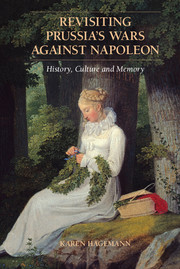Book contents
- Frontmatter
- Epigraph
- Contents
- List of Figures and Maps
- List of Abbreviations
- Acknowledgments
- Revisiting Prussia’s Wars against Napoleon
- Part One A History of Defeat, Crisis and Victory
- Part Two Discourses on the Nation, War and Gender
- Part Three Collective Practices of De/Mobilization and Commemoration
- Part Four Literary Market, History and War Memories
- 12 Politics, Market and Media
- 13 Inventing History
- 14 Remembering the Past
- Conclusion
- Part Five Novels, Memory and Politics
- Epilogue Historicizing War and Memory, 2013–1813–1913
- Bibliography
- Name Index
- Subject Index
- Plate section
Conclusion
Published online by Cambridge University Press: 05 March 2015
- Frontmatter
- Epigraph
- Contents
- List of Figures and Maps
- List of Abbreviations
- Acknowledgments
- Revisiting Prussia’s Wars against Napoleon
- Part One A History of Defeat, Crisis and Victory
- Part Two Discourses on the Nation, War and Gender
- Part Three Collective Practices of De/Mobilization and Commemoration
- Part Four Literary Market, History and War Memories
- 12 Politics, Market and Media
- 13 Inventing History
- 14 Remembering the Past
- Conclusion
- Part Five Novels, Memory and Politics
- Epilogue Historicizing War and Memory, 2013–1813–1913
- Bibliography
- Name Index
- Subject Index
- Plate section
Summary
A closer analysis of the development of the literary market, the popular, military and academic historiography on the period of the Napoleonic Wars and the publication of autobiographies and war memoirs treating this era up to the First World War reveals remarkably clear trends in the production of memories of the Anti-Napoleonic Wars. It shows the increasing influence of the expanding literary market and with it the creation of a culture-consuming national public. It points to the growing authority of the master narratives produced by a professionalizing academic historiography, but also demonstrates that these master narratives were always challenged by the counter-narratives of academic, military and popular historians – even though the multiplicity of interpretations accepted in academia declined and a pro-Prussian, monarchic-conservative or national-liberal interpretation of the period of the Anti-Napoleonic Wars gained ascendancy in Imperial German historiography. Furthermore, this analysis demonstrates that throughout the nineteenth century, the master narratives of historians competed with the far more diverse recollections of the era in published autobiographies and war memoirs. These memory texts reveal the broadest diversity of interpretations, because the majority of them were not written by Prussian supporters of the struggle against Napoleon, but by soldiers, officers and generals who had fought in the Napoleonic army up to 1813.
For both historiography and autobiographical accounts, the importance of the twenty-fifth, fiftieth and one-hundredth anniversaries of the wars as occasions for writing and publishing is striking. Political events such as the Rhine crisis, the failure of the Revolution of 1848–49, the Wars of German Unification and the founding of the German Empire clearly left their mark on the narratives and their reception. While the commercialization of the literary market and the growing readership had more influence on the production of autobiographical memory, both contributed especially to the boom in edited reprints of autobiographical accounts of the Anti-Napoleonic Wars occasioned by the hundredth anniversary.
- Type
- Chapter
- Information
- Revisiting Prussia's Wars against NapoleonHistory, Culture, and Memory, pp. 335 - 336Publisher: Cambridge University PressPrint publication year: 2015



